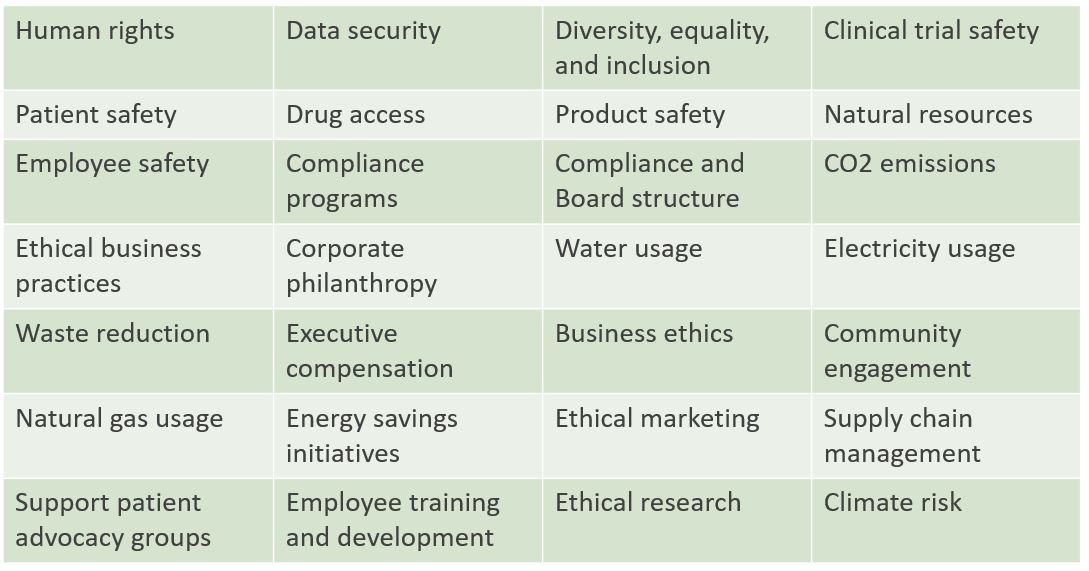The impact of ESG investing is too significant to ignore and with the battle for funds at its peak, the biotech industry needs to be at the forefront of the agenda. With impending mandates, the pressure is firmly on businesses to start thinking about their ESG proposition and how it may positively influence and affect the wider industry.
Corporate social responsibility has, for some time, been a major consideration in investment decisions. The integration of environmental, social, and governance (ESG) factors is not a novel concept and has been high on investor and stakeholder agendas for almost two decades. Shifts in attitude, predominately led by millennials, have propelled ESG discussions in boardrooms over recent years, as investment funds with an ESG focus raise billions based on more than just financial metrics. With this in mind, and as ESG data and reporting standards move from voluntary to mandatory, biotechs are likely to have a significant problem on their hands that will need addressing, and quickly. Considerable efforts are needed to bring the ESG agenda forward to earlier stage, pre-listed biotechs, to get ahead of the curve and preempt mandates that are likely to come into force further down the road.

The biotech industry, predominately pre-commercial publicly listed companies, is some way behind the curve, with a recent study conducted by law firm Fenwick reporting a huge 70% who have not referenced ESG in their recent public disclosures. Factors such as the maturity of a company are key considerations, as the longer a company is public, the more likely it is to report on such practices. With 2021 seeing a record-breaking number of initial public offerings (IPOs) by biotechs, we are likely to see a flurry of ESG disclosures over the course of 2022 and beyond as the U.S Securities and Exchange Commission (SEC) tightens the screws on reporting requirements. This is further backed up by the Fenwick survey which reported that out of 100 biotech executives approached from biotechs and investors with a market cap of $100 million to more than $4 billion, ‘92% of respondents think ESG disclosures will become more important in 2022’. Specific to investors, it was reported that they ‘expect ESG’s prominence to grow’ and ‘pointed to increasing pressure from clients to include ESG-focused companies in portfolios’.
Before we discuss why ESG factors are likely to be the cornerstone of future investment decisions, it would be sensible to look at the metrics that are likely to be reported. It is widely reported that investors and executives think there is a clear lack of standardised reporting metrics, so if mandated by the SEC, efforts must be made to ensure the reporting metrics are transparent. In turn, this will give investors and executives the ability to measure year-on-year progress and allow for cross-company comparisons, likely facilitating further ESG reporting. Josh Blackman, Partner in Boyden’s UK & Ireland Healthcare & Life Sciences practice strongly believes that the industry clearly sees the importance of the ESG agenda but high levels of ambiguity around what is required to be reported on are stifling progress
.
If we were to hazard a guess at which reporting metrics are likely to be required, they may be:

Along with the lack of standardised metrics, it appears there is a similar lack of consensus around which metrics to track and the relative importance of each. This begs the question of what the regulations are likely to stipulate. However, according to the report, there was a clear preference on reporting on social metrics over environmental or governance.
One area that is gaining significant momentum, and for good reasons, is equality, diversity, and inclusion (ED&I). With the SEC approving rules in the latter part of 2021 that require most Nasdaq-listed companies to have at least two diverse directors (one women and one member from an underrepresented community), and to provide annual statistics around board diversity, biotech companies will be required to report on this. Although 70% of the 50 biotech companies surveyed by Fenwick reported that they had at least two female board members, there is a clear focus on disclosures relating to gender with little reference made to ethnicity, disability, sexual orientation, socio-economic, neuro-diverse, or national origin.

If we look at ED&I, early stage, pre-public biotechs have the agility to adopt strategies that will have a positive, swifter effect on creating a sustainable pipeline of diverse talent whereas the larger, more established companies have the firepower to impact the sector overall,
comments Nick Bellwood, Partner in Boyden’s UK & Ireland Healthcare & Life Sciences Practice. Nick goes on to say, until the supply of entry-level talent is truly diverse, efforts from major companies will continue to scratch the surface of the problem without addressing the root cause.
As businesses look to grow through either an IPO or sale and have, to date, made limited efforts in creating and retaining a diverse workforce, they are likely to be faced with significant challenges when looking for external talent. As the market has reached peak biotech formation, the war on talent is in full swing, making it harder for lesser-known companies to attract the best, diverse talent. The more prominent a company becomes, the more specific they are likely to be on the background, skillset, and diversity of an executive, further reducing the available talent pool. As recently reported by fiercebiotech, ‘it’s time for musical chairs’ with future leaders ‘getting a shot at the CEO job right now rather than having to slog through the pharma world and wait for an opening’. Laying a solid foundation for future, diverse leaders should be a top priority for pre-public biotechs otherwise they will soon be struggling when trying to target external executive talent.

As we head towards the end of Q2, companies should be looking at how they can start to prepare as ESG’s importance shows no signs of waning. Currently, there appears to be a ‘chicken-and-egg’ situation where biotechs are looking at each other to compare what ESG issues they should be reporting. Ultimately, what is important to their business and their key shareholders and investors should be high on their priority list. An important consideration is who within the business should have overall oversight and ultimately hold the board accountable for its ESG activities and disclosure. It could either come from existing internal colleagues as part of a multidisciplinary committee or an individually dedicated resource. The latter option, and one that some companies are adopting, is the hiring of a CSO. No, not Chief Scientific Officer but Chief Sustainability Officer. This newly created position potentially could aid in evaluating the business’s current impact on the environment; the environment’s impact on the business; and determine how to increase the business’ sustainable practices and mitigate its risks. This may well provide the board and investors with the required assurance that this individual is likely to remain impartial on business decisions whilst ensuring concerted efforts are made to drive the ESG agenda forward.
As biotechs look ahead at commercialisation, and start selling assets, the type of metrics being reported is likely to shift. Probi, a publicly listed commercial biotech, is an example of business who are on a journey of sustainability with its VP of HR & Sustainability, Basudha Bhattarai Johansson, believing all companies, regardless of size, can contribute to making the world a better place.
Johansson continues when Probi is helping people around the world to improve their health, we’re making fundamental changes in society and showing that life and health are important.
Larger, more established pharmaceuticals traditionally have scored poorly on ESG ratings as past scandals and pricing controversies have weighed down their performance. As litigation payouts and drug prices seem to have fallen, the dial is likely to swing. Coupled with a recent PwC report showing 56% of consumers having an increased positive perception of the industry linked to their role in vaccine and treatment developments, now seems the perfect time to take steps to prolong this positive perception of the industry. Record-breaking profits in 2021, an example being Pfizer’s 92% increase from $42 billion to $80 billion, are unlikely to aid positive public perception as many will see the industry profiting from the pandemic. If businesses can be seen to reinvest profits into ESG areas, this is likely to go a long way.





